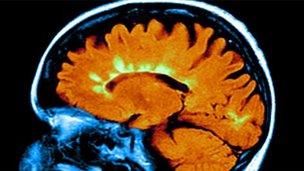Gene flaw 'explains why drugs failed to treat MS'
- Published

The findings provide more understanding of MS
Scientists have identified why a once-promising class of drugs do not help people with multiple sclerosis.
An Oxford University team say a genetic variant linked to MS means the drugs which work for patients with other autoimmune diseases will not work for them.
The team, writing in Nature, say the drugs can actually make symptoms worse.
Experts say the work shows how a person's genetic make-up could affect how they responded to treatment.
The drugs, called anti-TNFs, work for patients with rheumatoid arthritis and inflammatory bowel disease, but they have not done so for patients with MS and researchers were unsure why.
Mimicking
The Oxford University team looked at one particular genetic variant, found in a gene called TNFRSF1A, which has previously been associated with the risk of developing MS.
The normal, long version of the protein sits on the surface of cells and binds the TNF signalling molecule, which is important for a number of processes in the body.
But the team discovered the variant caused the production of an altered, shortened version which "mops up" TNF, preventing it from triggering signals - essentially the same thing that TNF blocking drugs do.
This explains why a study 10 years ago found the drugs make MS patients significantly worse and exacerbate the disease, the researchers suggest.
Professor Lars Fugger of the Nuffield Department of Clinical Neurosciences, who led the work, said: "The hope has been that analyses of the whole human genome would lead to findings that are clinically relevant.
"We show that this is possible. It's one of the first such examples, certainly in autoimmune disease."
He added: 'Whilst the TNFRSF1A gene variant is linked to a modest risk of developing MS, the drug that mimics the effect of the variant has a considerably greater impact.
"The effects of genetic variants influencing disease risk or resistance can be amplified by drugs. This has often been completely overlooked, but will be critical for using genetic findings in a medical context."
Nick Rijke, director of policy and research at the MS Society, said: "There are many genes associated with MS, but we know little about the role they play or the influence they have on the condition.
"This important study has shown that some of your genes can play a part in deciding whether or not you respond to a treatment.
"In the future this could help ensure that people with MS are offered the drug treatments that are most likely to work for them."
- Published30 May 2012
- Published30 April 2012
- Published8 December 2011